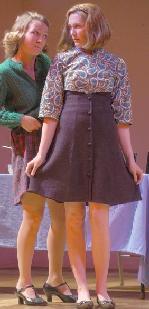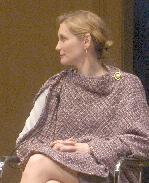SITE GUIDE
REVIEWS
FEATURES
NEWS
Etcetera and
Short Term Listings
LISTINGS
Broadway
Off-Broadway
NYC Restaurants
BOOKS and CDs
OTHER PLACES
Berkshires
London
California
DC
Philadelphia
Elsewhere
QUOTES
On TKTS
PLAYWRIGHTS' ALBUMS
LETTERS TO EDITOR
FILM
LINKS
MISCELLANEOUS
Free Updates
Masthead
A CurtainUp  Berkshires Review
Berkshires Review
 Berkshires Review
Berkshires Review
The Heidi Chronicles
By Elyse Sommer
|
I don't blame any of us. We're all concerned, intelligent, good women. It's just that I feel stranded. And I thought the whole point was that we wouldn't feel stranded. I thought the point was we were all in this together --- Dr. Heidi Holland's speech to Miss Crain's School East Coast alumni association luncheon which refflects her increasing sadness at seeing her ideals, romantic prospects and sense of a feminine community fall away during the success-oriented Reagan era. |

Lynn Hawley and Kate Jennings Grant as friends Susan and Heidi when they're still awkward teens at a dance
(Photo: Kevin Sprague) |
I can't think of a better way to honor Wasserstein's memory than with director Maria Mileaf's true to the original, but not slavishly so, revival, performed by a terrific cast. Scoop Rosenbauml, Wasserstein's fictional personification of a macho male who prompts smart women's foolish choices and has a habit of grading everything and everyone would give these actors (including the one portraying him) an A+.
The saga of Heidi Holland is a very personal journey through the women's movement and every other seminal event from 1965 to 1989. Heidi's relationships produce no happy endings, her disillusionment with the Reagan era greed put a dent in her sense of "we're in this together" and leave her "feeling stranded." It is less an epic Greek tragedy than a tragedy of dashed hopes and dreams but, as Wasserstein herself has been quoted as saying "though women are often said to write 'small tragedies,' they are our tragedies, and therefore large and therefore legitimate."
Wasserstein's whole, all too prematurely finished oeuvre could be summed up as small but personal and consequently large tragedies. The Heidi Chronicles ends as it began, at the beginning of a new era with new options. It is thus an integral part of still evolving social issues. The Sisters Rosenzweig, the modern day Three Sisters which followed Heidi's chronicles and her last play, Third, are more mature and broad-based works. Yet, especially when done as well as the current Stockbridge production, The Heidi's Chronicles remains engaging because it's buoyed by the trademark Wasserstein humor that enables us to be amused and charmed even by its stereotypes, including the relentlessly macho Scoop Rosenbaum.

Kate Jennings Grant's Heidi during the more mature phase of her Heidi Chronicles.
(Photo: Kevin Sprague) |
When the story flashes back to Heidi's own history from an opening lecture about the history of women in art, it takes us to a high school dance where the "we're in this together" theme is illustrated by a teenaged Heidi and her best friend Susan hilariously coping with their still unexplored sexuality. From there it's onward quite straightforwardly through the events that shaped Heidi and her friends: The 1968 Eugene McCarthy presidential campaign, a protest by the Women's Art Coalition, Scoop's wedding to a non-challenging woman at the Pierre Hotel, the death of John Lennon, the greed is good 1980's, the onset of AIDS and the crucial decisions that come with approaching middle age.
Under Ms. Milaef's pacey direction, the BTF cast taps into every nuance of Wasserstein's richly comic dialogue and good-humored ironic take on this we can do anything generation, turning all the types represented into real people. (With four of the seven actors playing mutiple roles we actually meet eighteen characters).
The hurrahs for the performances must, of course, begin with the title character. Kate Jennings Grant is a Heidi to cherish, whether an awkward teen, a college aged student unable to resist the smart-assed charisma of Scoop, or an older, wiser woman on the verge of as yet unexplored new horizons. Grant brings enough poignancy to her role to avoid the danger of having her character come off as too much of a critical observer. Her delivery of the long monologue (excerpted at the top of this review) to the students of Miss Crain's School, is masterfully delivered.
Lynn Hawley nails the role of best friend Susan since high school, with one especially drop-dead scene as the gone-Hollywood Susan does a marvelous variation of The Ladies Who Lunch. The multi-tasking Patricia Buckley, Jenn Harris and Laura Heisler add variety and humor to the chronicles.
Scott Lowell (TV serial watchers will probably recognize him as Ted the accountant in Queer as Folks), pulls off the difficult role of making Scoop at once obnoxious and appealing enough for us to understand why Heidi not only finds him irresitably attractive but remains friends with him throughout the years. The other major male role is a bravura portrayal by Tom Story as another long-time Heidi friend, Peter Patrone. One of the play's ironically funny scenes is a TV interview in which the three friends, now all famous in different spheres (Heidi as a renowned scholar and author, Scoop as the publisher of a trend setting magazine and Peter as New York's highest ranked pediatrician), are seated side by side, with the men shamelessly hogging the limelight and the female interviewer (Buckley) doing nothing to see to it that Heidi has her say.
Neil Patel's set, smartly lit by David Lander, is unfussy yet establishes the changing locales and Janus Stefanowicz gets the changing fashions of the years covered just right. If Wendy Wasserstein were still with us she would be thrilled to see women in charge of this area's major theaters, one of them responsible for so lovingly bringing Heidi and her friends back to life. Oh, and don't think of this as a for women play. The response to Heidi's chronicles from my husband and all the men in the audience (Golden agers as well as the Wendy generation) was what Scoop Rosenbaum would rate a triple A+.
To read more about Wendy Wasserstein's life and work see the Wasserstein page in our playwright's album.
|
THE HEIDI CHRONICLES
Playwright: Wendy Wasserstein Director: Maria Mileaf Cast: Kate Jennings Grant (Heidi Holland), Scott Lowell (Scoop Rosenbaum), Lynn Hawley (Susan Johnston), Tom Story (Peter Patrone), Christopher Corts (Chris/Mark/Waiter/Ray), Jenn Harris (Jill/Debbie/Lisa, Patricia Buckley (Fran/Molly/Betsy/April), Laura Heisler(Becky/Clara/Denise). Set Design: Neil Patel Costume Design: Janus Stefanowitz Lighting Designer: David Lander Sound Design: Scott Stauffer Berkshire Theatre Festival Main Stage, Stockbridge, MA Augus 15 to September 2, 2006; opening August 18th Monday through Saturday at 8pm with matinees at 2pm on Thursdays and Saturdays Tickets: $37 to $64. Students with valid ID receive fifty percent discount. Reviewed by Elyse Sommer based on August 18th performance |

Berkshire Hikes &
The Berkshire Book

6,500 Comparative Phrases including 800 Shakespearean Metaphors by CurtainUp's editor.
Click image to buy.
Go here for details and larger image.


